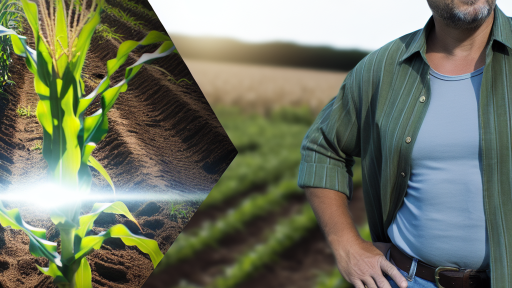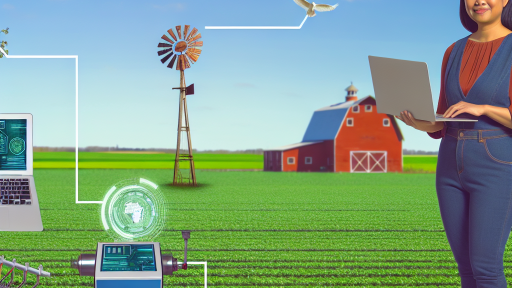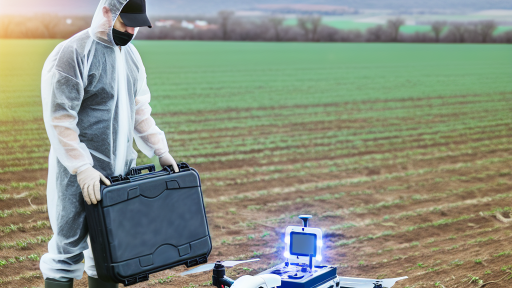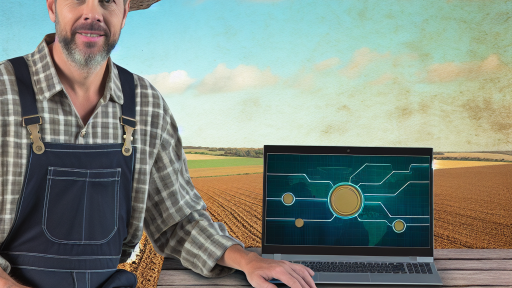Introduction to Drone Technology in Agriculture
Emergence of Drones in Farming
Drone technology has emerged as a game-changing tool in agriculture.
Farmers increasingly utilize drones to enhance productivity and efficiency.
These unmanned aerial vehicles offer various applications for modern farming.
Consequently, they redefine traditional farming methods.
Benefits of Utilizing Drones
Drones provide farmers with aerial views of their crops.
This perspective allows for better monitoring and assessment of crop health.
In addition, drones assist in optimizing resource allocation.
Farmers can use data collected to apply fertilizers and pesticides accurately.
As a result, this leads to healthier crops and reduced environmental impact.
Precision Agriculture Revolution
Precision agriculture benefits greatly from drone technology.
Drones gather real-time data to inform farmers’ decisions.
This information includes soil conditions, moisture levels, and yield potential.
Thus, farmers can make informed adjustments to their practices.
Ultimately, precision agriculture improves overall sustainability.
Challenges and Considerations
Despite many benefits, drone technology also presents challenges.
Transform Your Agribusiness
Unlock your farm's potential with expert advice tailored to your needs. Get actionable steps that drive real results.
Get StartedRegulatory hurdles can limit drone usage in certain regions.
Moreover, farmers require training to operate drones effectively.
Additionally, the initial costs of purchasing drones can be a barrier.
However, as technology advances, these challenges may diminish.
Future of Drones in Agriculture
The future of drone technology in agriculture looks promising.
Continued advancements will likely improve drone capabilities.
Farmers can expect drones to become more cost-efficient and user-friendly.
Furthermore, integration with other technologies will enhance their effectiveness.
Ultimately, drones will play a crucial role in sustainable farming practices.
Overview of Sustainable Farming Practices
Definition of Sustainable Farming
Sustainable farming is an approach focused on long-term agricultural productivity.
This method emphasizes environmental health and resource conservation.
Furthermore, it promotes social equity and economic viability.
Key Principles of Sustainable Farming
The principles of sustainable farming include biodiversity and crop rotation.
These practices increase resilience against pests and diseases.
Additionally, they improve soil fertility and reduce erosion.
Integrated pest management minimizes the use of harmful chemicals.
Water conservation techniques ensure efficient use of resources.
Benefits of Sustainable Farming
Sustainable farming enhances food security and agricultural resilience.
It reduces the carbon footprint associated with traditional farming methods.
This approach also promotes healthier ecosystems and wildlife habitats.
Moreover, it fosters community relationships and improves local economies.
Challenges of Sustainable Farming
Adopting sustainable practices can require significant initial investment.
Farmers may face resistance to change from traditional practices.
Additionally, there may be a lack of access to sustainable technologies.
Showcase Your Farming Business
Publish your professional farming services profile on our blog for a one-time fee of $200 and reach a dedicated audience of farmers and agribusiness owners.
Publish Your ProfileFurthermore, inconsistent policies can hinder long-term planning.
Current Trends in Sustainable Agriculture
Technological advances support data-driven decision-making in farming.
Precision agriculture optimizes inputs and reduces waste.
Additionally, organic farming continues to gain popularity among consumers.
A growing interest in regenerative practices enhances soil health and biodiversity.
The Role of Drones in Precision Agriculture
Introduction to Drones in Agriculture
Drones have transformed the landscape of modern agriculture.
They provide innovative solutions to traditional farming challenges.
Farmers increasingly rely on drone technology for data collection.
Enhancing Crop Monitoring
Drones excel in monitoring crop health accurately.
They utilize high-resolution cameras to capture real-time images.
This imagery allows farmers to assess plant health quickly.
Consequently, they can make informed decisions on crop management.
Soil and Field Analysis
Additionally, drones help in analyzing soil conditions.
They can map out soil variability across large fields.
This data enables precise application of nutrients and fertilizers.
As a result, farmers achieve higher efficiency and lower costs.
Irrigation Management
Drones play a critical role in irrigation management.
They help identify areas requiring more water.
Through this data, farmers can optimize their irrigation systems.
Ultimately, this leads to water conservation and reduced waste.
Pest and Weed Control
Moreover, drones assist in identifying pest infestations.
They offer insights into weed growth patterns as well.
This information allows farmers to target treatments effectively.
Consequently, it reduces chemical usage and promotes sustainability.
Data-Driven Decision Making
Drones facilitate data-driven decision-making in agriculture.
They provide actionable insights in real time.
This helps farmers optimize their operations continually.
As a result, production efficiency increases significantly.
Case Studies and Success Stories
Various farmers have implemented drone technology successfully.
For instance, Alex Thompson reported higher yield rates after using drones.
His farm experienced better pest control and optimized irrigation.
Similarly, Green Fields Farms noted substantial cost savings.
They benefited from improved soil management using drone data.
Explore Further: Biotechnology Innovations Driving Smart Agriculture
Benefits of Using Drones for Crop Monitoring
Enhanced Crop Surveillance
Drones provide a bird’s-eye view of entire fields in minutes.
This capability allows farmers to identify problem areas quickly.
With high-resolution images, they can track crop health effectively.
Regular monitoring helps to catch diseases before spreading.
Data Collection and Analytics
Drones gather vast amounts of data with precision.
This data enables detailed analysis of crop conditions.
Showcase Your Farming Business
Publish your professional farming services profile on our blog for a one-time fee of $200 and reach a dedicated audience of farmers and agribusiness owners.
Publish Your ProfileFarmers can use analytics to optimize their yield predictions.
Additionally, they can assess nutrient and water needs accurately.
Cost-Effectiveness
Using drones can reduce labor costs significantly.
This technology minimizes the need for manual scouting of fields.
As a result, farmers save time and resources.
Moreover, the investment in drone technology pays off quickly.
Environmental Impact
Drones contribute to sustainable farming practices.
They help optimize pesticide and fertilizer use.
This reduction lowers chemical runoff into surrounding ecosystems.
Consequently, drones promote healthier agricultural landscapes.
Improved Decision-Making
Drones enhance decision-making through timely data acquisition.
Farmers can respond swiftly to crop issues as they arise.
Additionally, they can plan seasonal activities based on reliable information.
Intelligent decisions lead to better crop management.
You Might Also Like: Overcoming Challenges in Controlled Environment Agriculture for Farmers
Case Studies: Successful Implementation of Drones in Sustainable Farms
Farmers Embracing Precision Agriculture
In 2022, Green Acres Farm implemented drone technology for crop monitoring.
They increased yield by 15% while using less water.
This innovative approach minimized resource wastage dramatically.
Moreover, drones provided real-time data on crop health.
This data helped target fertilizers and pesticides more effectively.
Data-Driven Decisions in Vineyard Management
Sunny Vineyards adopted drone mapping for their grape production.
This technique allowed detailed analysis of soil condition and moisture levels.
The vineyard achieved a 20% reduction in irrigation needs.
In turn, this led to healthier vines and higher-quality grapes.
Additionally, they could identify pest infestations early.
Improving Crop Health with Aerial Surveillance
Westfield Farms used drones to enhance their crop monitoring system.
The drones captured high-resolution images of fields weekly.
This ongoing surveillance revealed disease outbreaks promptly.
Consequently, farmers could implement corrective measures faster.
They also minimized chemical use, supporting sustainable practices.
Maximizing Efficiency in Organic Farming
Eco-Friendly Farm integrated drones for precision planting.
By mapping the terrain accurately, they optimized seed placement.
This method reduced over-planting and waste significantly.
As a result, they reported a 10% increase in organic yields.
Furthermore, drone technology enabled better farm management overall.
Collaboration with Tech Companies
Harvest Innovations partnered with DroneTech Solutions to innovate farming.
This collaboration focused on developing tailored drone software.
The software analyzed data and provided actionable insights.
Farmers received alerts for weather changes and pest activity.
This proactive management enhanced overall crop resilience.
Showcase Your Farming Business
Publish your professional farming services profile on our blog for a one-time fee of $200 and reach a dedicated audience of farmers and agribusiness owners.
Publish Your ProfileLearn More: How Digital Finance Enhances Agricultural Operations Efficiency
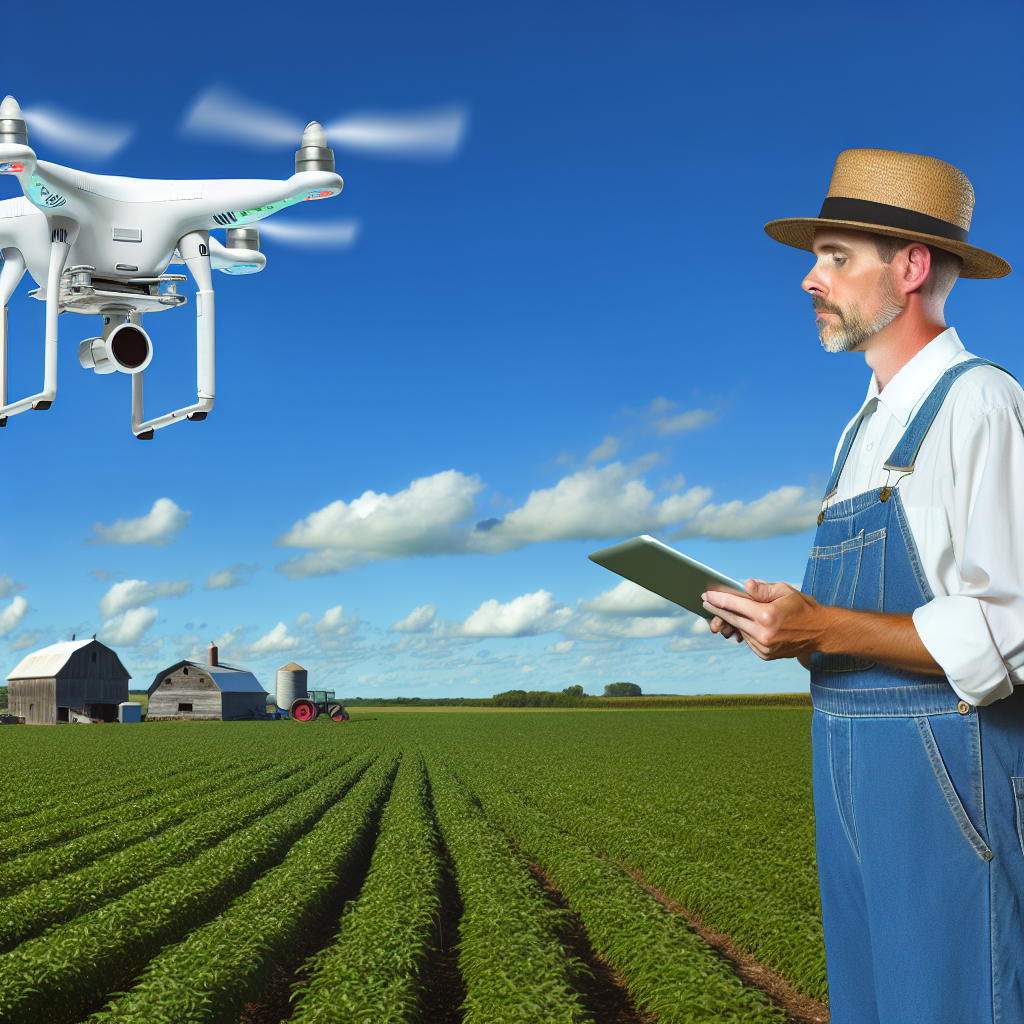
Challenges and Limitations of Drone Technology in Agriculture
Regulatory Hurdles
Drone usage in agriculture faces significant regulatory challenges.
Government regulations vary widely across regions.
Farmers must navigate local laws to use drones effectively.
Compliance can be both time-consuming and costly.
Moreover, regulations restricted to airspace can limit operational flexibility.
Technical Limitations
Despite advanced technology, drones have limitations.
Battery life remains a critical concern for extended operations.
Most agricultural drones provide limited flight times.
Payload capacity poses another challenge for many models.
These factors can restrict their efficiency in large-scale farming.
Data Management Issues
Drones collect vast amounts of data in a short time.
However, managing this data effectively proves difficult.
Farmers often require specialized software to analyze results.
This software can be costly and requires a learning curve.
Furthermore, interpreting data can be complex without proper training.
Weather Dependency
Weather conditions significantly affect drone operations.
High winds, rain, or poor visibility can hinder functionality.
Consequently, farmers must carefully plan their drone flights.
Reliability during adverse weather remains a significant concern.
As such, farmers need backup strategies for such instances.
High Initial Costs
Purchasing drones involves substantial initial investments.
This cost can deter small farmers from adopting the technology.
In addition to drones, specialized equipment may be necessary.
Training staff also incurs additional expenses.
These costs can be a barrier to entry for many agricultural operations.
Explore Further: AI Solutions For Pest And Disease Management
Future Trends of Drones in Enhancing Sustainability in Farming
Precision Agriculture
Drones will play a crucial role in precision agriculture.
Farmers can monitor crop health with high-resolution imagery.
This technology will reduce the need for chemical treatments.
Consequently, it minimizes environmental impact.
Data Collection and Analysis
Future drones will enhance data collection capabilities.
Advanced sensors will provide real-time analysis of soil conditions.
This data aids farmers in making informed decisions.
As a result, productivity will improve while conserving resources.
Resource Management
Drones will optimize water usage in agriculture.
They will detect areas requiring irrigation based on soil moisture.
Farmers can use this data to apply water more efficiently.
This approach conserves water and enhances crop yields.
Integration with AI and Automation
The combination of drones and AI technology will change the industry.
Showcase Your Farming Business
Publish your professional farming services profile on our blog for a one-time fee of $200 and reach a dedicated audience of farmers and agribusiness owners.
Publish Your ProfileFarmers will automate tasks, reducing labor costs significantly.
AI will analyze data to predict crop outcomes accurately.
Subsequently, this will help in strategic planning for planting and harvesting.
Environmental Monitoring
Drones will be essential in monitoring environmental health.
They can identify changes in biodiversity and habitat conditions.
This ensures sustainable farming practices are followed.
Moreover, it helps farmers comply with regulations more efficiently.
Market Access and Supply Chain Optimization
Drones can streamline supply chain logistics for farmers.
They will deliver products directly to markets more efficiently.
This innovation will reduce transportation emissions significantly.
Additionally, it enhances overall food safety and tracking.
The Importance of Integrating Drone Technology for Sustainable Agriculture
Enhancing Precision Agriculture
Drone technology significantly improves precision agriculture practices.
Farmers use drones to monitor crop health remotely.
This method provides real-time data on plant conditions.
As a result, decisions are more data-driven and accurate.
Consequently, farmers can apply fertilizers and pesticides more efficiently.
Reducing Environmental Impact
Integrating drones reduces the overall environmental footprint of farming.
Drones help minimize chemical usage, which protects water sources.
Additionally, targeted applications decrease waste and promote sustainability.
This approach aligns with goals for reducing greenhouse gas emissions.
Improving Resource Management
Drones facilitate better water management in agriculture.
Farmers can identify areas requiring irrigation more accurately.
This ensures efficient use of water resources and prevents wastage.
Furthermore, drones assist in soil health monitoring and management.
Enhancing Crop Yield and Profitability
Adopting drone technology can lead to increased crop yields.
Farmers can identify crop diseases and pest infestations early.
This proactive approach results in healthier plants and better harvests.
Consequently, profitability rises due to reduced losses and higher productivity.
Increasing Accessibility and Cost-Effectiveness
Drone technology has become more accessible for small-scale farmers.
Many companies offer affordable drone solutions tailored for various operations.
This democratization of technology allows more farmers to benefit.
Ultimately, it helps level the playing field in agriculture.

